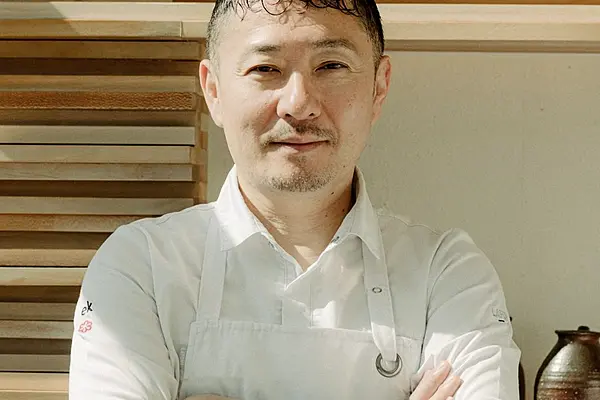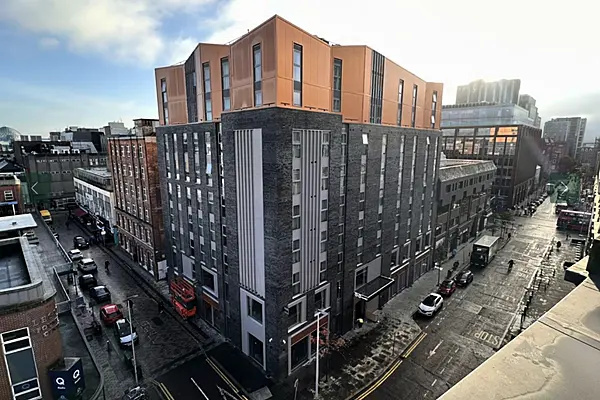Endo Kazutoshi, who's restaurant Endo at the Rotunda was awarded a Michelin star in 2020, talks sushi, traditional Japanese culture and Judo with Hospitality Ireland.
Endo Kazutoshi was born in Yokohama, Japan’s second-largest city, just south of Tokyo. He is a third-generation sushi master, following in the footsteps of both his father and grandfather. His debut restaurant, Endo at the Rotunda, is an 11- seater omakase experience, with the spirit of omotenashi, which translates into ‘the art of hospitality rooted in empathy’. Awarded a Michelin star in 2020, it was voted the UK’s Best Restaurant at the 2023 GQ Awards and ranked at number 38 in the Top 100 Restaurants in the UK by the National Restaurant Awards this year.
This article was originally published in the Winter 2023 issue of Hospitality Ireland Magazine, in December of 2023.
Tell us about your background – where you grew up, studied, etc.
I grew up in Yokohama, a port city in Kanagawa Prefecture, the third generation in the family of sushi masters. My upbringing was quite traditional, especially in the way that we ate at home. My father and grandfather both cooked for the family, and, growing up, I was exposed to a lot of traditional techniques and quite old-school food, which really trained my palate. In Japanese culture, you are expected to follow into the family business, although I chose university at first, which isn’t at all the norm for a sushi chef.
What first drew you to hospitality?
My father and grandfather have always inspired me, and I knew I would follow in their footsteps to become a sushi master myself. Japanese culture is really traditional like that, and it’s the done thing to follow into a family business. At the same time, I knew that this was my calling – a way of continuing my family’s legacy by making my own mark.
What brought you to the UK?
I wanted to expand my culinary horizons and learn techniques from other chefs who aren’t sushi masters. A formative experience for me was working at the River Cafe. It was there that I got to work with wonderful seasonal ingredients and develop alongside other ambitious chefs.
How do you blend your Japanese background and influences with British ingredients?
In Japan, we are very lucky to have a wealth of ingredients because of our varied geography and climate. Being an island nation, seafood, especially, is a huge part of our national identity, and I feel that this is the same with Britain. Although the British don’t eat seafood in the same way as the Japanese, there are still a lot of similarities in our approaches. The Japanese approach is deeply rooted in seasonality – we believe in making each moment meaningful. Britain’s well-developed agriculture and fishing fosters this seasonal approach, and I am lucky to be able to work with some amazing suppliers.
When did you first realise that you wanted to do this professionally?
I suppose this was always my destiny because of my family background, so there is no clear starting point. My whole life experience is based in cooking and, more specifically, in sushi – this vocation was with me from as long as I can remember. In a lot of ways, I have devoted my life to mastering the art of sushi. I am a third-generation sushi master, so it very much felt like it was my destiny to continue that legacy. In Japanese culture, following family tradition is usual. I want to preserve the history and technique surrounding sushi, to sustain balance and harmony in each and every dish that I make, so that each bite feels meaningful.
What was your first big role? What was that like?
My first big role was when I started working with my dad in his restaurant. It was an amazing experience to learn ‘sushi master skills’ straight from him. He’s taught me a lot about guest interaction and how to ‘serve’ and compose sushi for guests. As a nation, we explore and share cuisine as a way to bond – it is human nature. For me, Japanese cuisine represents more than just what I eat every day. It is my philosophy for life and the best way to reflect the culture of my country, and I guess it is something that was transmitted to me by my father as well.
What is the omakase experience?
Omakase means that you ‘leave it up to the chef’. It’s a way of fully surrendering yourself to their knowledge and skill. Many people mistakenly believe that omakase just applies to sushi, but it can apply to multiple styles. It is a multi- course meal that celebrates the freshest produce of the day, highlighted by the craftsmanship of the chef.
Why did you set up Endo at the Rotunda? I always knew that I wanted to set up on my own and continue my family’s legacy through my own personal style. Endo at the Rotunda is a reflection of my gratitude. The restaurant is based around the idea of hand to heart – it’s a very personal space.
When we opened – in 2019 – I had a vision for where I wanted the restaurant to go. Looking back, I cannot imagine it could have been any better than what it is today. Of course, there is always space for evolution. We should always be growing.
How did you find that?
It was incredibly liberating to open my own restaurant that totally followed my vision. I wanted everything to feel part of a whole, to be an expression of my nature. Everything at the Rotunda is custom-made for us, from the cutlery to the counter.
Tell us about Endo at the Rotunda – the ethos, food, service, etc.
My philosophy follows the Japanese saying ichi-go ichi-e, which means ‘one time, one meeting.’ It’s about creating a unique experience that cannot be repeated again. My approach also embraces the principle of shokunin – a way of mastering your profession through a mediation between skill and spirit. Being an artist or an artisan is as much about the mindset as it is about ability, and that is why the Rotunda is so personal to me. Everything from the food to the service is a reflection of myself and works in unison, in order to create a single, special experience.
Tell us about gaining a Michelin star.
We were always busy, but things really stepped up after the Michelin star. The Rotunda acquired a new energy that I am proud to continue. The award was a significant point in our development as a restaurant and has brought in a wider range of customers, which has been very rewarding. It is also wonderful to have your vision understood and recognised in such a way.
What does judo bring to your life?
Like cooking, judo is about discipline and practice. You have to put in the time and the effort to properly succeed, to ground yourself in the basic principles of the art, which will then stand you in good stead. Judo grounds me, both physically and mentally. It is also respecting your opponent and really trying to understand them in order to anticipate their next move. In a way, this is what you have to do for your guests, too. It’s about forming a connection and understanding, which means that you are able to deliver the right experience for them.
What does punk music bring to your life?
Punk is an expression of my passion. It’s an attitude which doesn’t shy away from self-expression. Japanese culture encourages control and discretion, though I believe it’s important to have a rebellious streak, like the one I found in my music.
How was Food On The Edge this year?
Food On The Edge was a fantastic opportunity to come together with other chefs I admire and to share in our shared passions. I really enjoyed spending some time in Ireland, too.
What is the value of an event like that?
I believe that conversation and sharing knowledge is an important part of being a chef, and we are frequently too absorbed in the day-to-day. That is why opportunities such as Food On The Edge are so important, and I enjoyed meeting and spending time with fellow chefs.
What makes a great restaurant?
A great restaurant creates a cohesive experience, where every part works in harmony with the rest. It’s not enough to just have good food – there needs to be a respect for the core concept. A great restaurant will make sure that every detail will be directed towards telling their story in a way that will be accessible to the diner.
What are the changing trends in hospitality – people’s expectations, new elements, etc.?
People are becoming more conscious of seasonal produce and where the ingredients come from. This is something we prioritise at the Rotunda, and this trend has pushed us further in our mission to create strong links with producers.
What are the major challenges at the moment?
There are many challenges within the industry at the moment, from financial pressures to staffing shortages. The price of quality ingredients is definitely on the rise, and our main challenge is to find the best produce at an agreeable price while supporting the farmers and fishermen we have long-standing working relationships with. We, as businesses, rely so heavily on good-quality ingredients to make our experience unique.
What are the main opportunities?
The main opportunities lie in sharing knowledge with other chefs and in embracing cultural differences and specificities. When I first moved to London, the understanding of Japanese cuisine was very different to what it really is, but, over time, this has developed, thanks to a greater curiosity on the part of the diners and the broader range of approaches taken by chefs.
What do you do when you’re not working?
I like to go fishing. It’s a great way to slow down and appreciate nature. I also like to eat out and experience a range of different cuisines and approaches.







